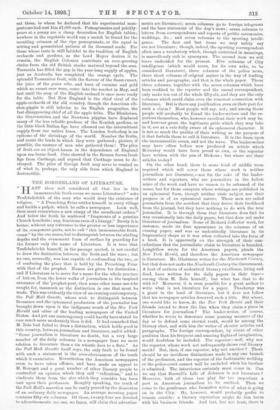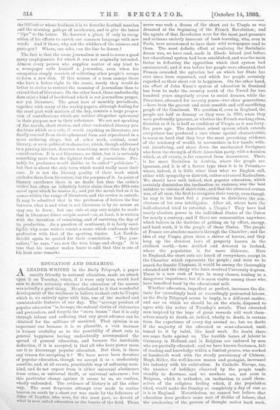THEBORDERLAND OF LITERATURE.
-HAST thou well considered all that lies in this immeasurable froth-ocean we name Literature P " asks Tertfelsdrockh of the man who would deny the existence of religion. " A Preaching Friar settles himself in every village and builds a pulpit, which he calls a newspaper. Look well, thou Beast everywhere a new clergy of the mendicant orders." And below the froth lie scattered "fragments of a genuine Church homiletic; nay, fractions even of a liturgy." Surely it is better, without any reference to the greater or less importance of its component parte, not to call " this immeasurable froth- ocean" by the one name, but to distinguish between the abiding depths and the evanescent foam of surface by guarding for the former only the name of Literature. It is true that "Teufeledrockh himself, in the passage quoted, is not careful to draw the distinction between the froth and the wave ; but no one, assuredly, was less capable of confounding the two, or of confusing the place that is held by the Preaching Friar with that of the prophet. Names are given for distinction ; and if Literature is to serve for a name for the whole praztice of letters, from the lower walks of journalism to the inspired utterance of the prophet-poet, then some other name must be sought for, inasmuch as the distinction is one that must be made. This was evidently the view of an evening contemporary, the Pall Mall Gazette, whose wish to distinguish between literature and the ephemeral production of the journalist has brought down upon it the indignant wrath of the New York Herald and other of the leading newspapers of the United States. And yet our contemporary could hardly have stated its case much more moderately than it did. It had remarked that M. Zola had failed to draw a distinction, which holds good in this country, between journalism and literature, and it added : " Some journalism is literature no doubt, but a very large number of the daily columns in a newspaper bear no more relation to literature than a tin whistle does to a flute." As the Pall Mall Gazette itself says, the only fault to be found with such a statement is the over-obviousness of the truth which it enunciates. Nevertheless the American newspapers seem to have taken offence, and have made an appeal to M. Bourget and a great number of other literary people to contradict an opinion which they call " ridiculous," and to vindicate them from the slur which they consider has been cast upon their profession. Roughly speaking, the troth of the Pall Mall's assertion can be easily proved by the dissection of an ordinary daily newspaper. An average morning paper contains fifty-six columns. Of these, twenty-four are devoted to advertisements (no one, we fancy, will claim that advertise.
merits are literature); seven columns go to foreign telegrams and the bare statement of the day's news ; seven columns to letters from correspondents and reports of public ceremonies, weddings, &c. ; and seven columns to the sporting intelli- gence. The first and last items we may safely say are not literature ; though, indeed, the sporting correspondent often uses a vocabulary which, though restricted in meanings, is marvellously rich in synonyms. The second item we will leave undecided for the present. .Five columns of City intelligence (which would scorn, for its own sake, to be considered literature), three columns of the police news, three short columns of original matter in the way of leading articles and paragraphs; and that is the whole paper. Those three columns, together with the seven columns which have been credited to the reporter and the casual correspondent, only make ten out of the whole fifty-six, and they are the only columns which could claim even the remotest connection with literature. But is there any justification even on their part for such a claim P Most people will say, not; and among those people will probably be found the leader-writers and the re- porters themselves, who, however excellent their work may be, and however great the legitimate pride which they may take in it, are as a rule fully aware of its ephemeral character. It is not so much the quality of their writing as the purpose of it that forbids them to call it literature. It is the foam upon the immeasurable ocean, and not the wave. The leader-writer may have often. before now produced an article which Macaulay would have been proud to own, or the reporter have written with the pen of Dickens ; but where are their articles to-day P On the other hand, there is some kind of middle term required which will cover those whose work is neither journalism nor literature,—not for the sake of the leader- writers and reporters, who are journalists in the fullest sense of the word, and have no reason to be ashamed of the name, but for those essayists whose writings are published in an ephemeral form, though neither their subject nor their purpose is of an ephemeral nature. These men are called journalists from the accident that they derive their livelihood from the journal, but they have nothing to do with the true journalist. It is through them that literature does find its way occasionally into the daily paper, but that does not make literature of journalism. Some of Richard Jefferies' work, for instance, made its first appearance in the columns of an evening paper, and was as undoubtedly literature in its fragmentary shape as it was when collected into the form of a book. It is apparently on the strength of their con- tributions that the journalistic claim to literature is founded. Longfellow wrote for the American papers, pleads the New York Herald, and therefore the American newspaper is literature. Mr. Gladstone writes for the Nineteenth Century, but that does not make the Nineteenth Century the Government. A host of authors of undoubted literary excellence, living and dead, have written for the daily papers in their time— among them M. Zola himself ; but what has that to do with it? Moreover, it is even possible for a great author to write what is not literature for a paper. Thackeray was a giant in the land of literature, but it does not follow that his newspaper articles deserved such a title. But where, one would like to know, do the New York _Herald and their friends intend to draw the line when they claim a place in literature for journalism P The leader-writer, of course, whether he wrote to denounce some passing measure of the day or to defend some eternal truth, would be among the literary elect, and with him the writer of shorter articles and paragraphs. The foreign correspondent, by virtue of other qualities than his frequent and amazing flights of imagination, would doubtless be included. The reporter—well, why not the reporter, whose work not unfrequently shows real literary merit P But, then, if one reporter, why not another P There should be no invidious distinctions made in any one branch of the profession, and the reporter of the fashionable wedding or the police-court cannot well be excluded when his brother is admitted. The interviewer certainly must come in. Can we say that Boswell's Life of Johnson is not literature P Moreover, both of these last play far too important a part in American journalism to be omitted. Then we come to the gentleman who furnishes notes of what is going on in the City. He, however, would probably prefer to remain outside ; a literary reputation might do him harm with his business friends. And last, but not least, there is the litMrateur whose business it is to describe football matches and the morning gallops of racehorses, and to give the latest " tips " to the better. He deserves a place, if only in recog- nition of his efforts to enrich our common language with new words. And if these, why not the wielders of the scissors and paste-pot P Where, one asks, can the line be drawn ?
The fact is that the name journalism is used to cover a good many employments for which it was not originally intended. Almost every person who supplies matter of any kind to a newspaper calls himself a journalist, even when his occupation simply consists of collecting other people's scraps to form a new dish. If this misuse of a term annoys those who have a better right to the name, surely they would do better to strive to restrict the meaning of journalism than to extend that of literature. On the other hand, there undoubtedly does exist akind of borderland which is not journalism proper, nor yet literature. The great host of monthly periodicals, together with many of the weekly papers, although dealing for the most part with matters of the day, contain a large propor- tion of contributions which are neither altogether ephemeral in their purpose nor in their substance. We are not speaking of the novels, short stories, and other undoubted literary pro. auctions which as a rule, if worth anything as literature, are finally rescued from their ephemeral form and reproduced in a more enduring shape, but of other work, critical, semi- literary, or even political in character, which, though addressed to a passing interest, deserves something more than the day's consideration, It is not literature, we think, but it is certainly something more than the lightest froth of journalism, Pro- bably its producers would dislike to be called " publicists " ; but that is about the only term which would really meet their case. It is not the literary quality of their work which excludes them from literature, but the purpose of it. In point of literary excellence there is no doubt but that the critic's review has often an infinitely better claim than the fifth-rate novel upon which he wastes it; and yet the novel, bad as it is, comes within the range of literature, and the review is outside. It may be admitted that in the profession of letters the line between what is and what is not literature is by no means an easy one to draw ; but one rule at any rate might be made, that in literature Wertz seripta mamset—or, at least, it is written with the intention of remaining, and of surviving the day of its production. As a question of sentiment, it is fairly intel- ligible why some writers resent a name which confounds their profession with that of the sporting tipster. Let Teufels- ariickh again be quoted for their consolation. " The jour- nalists," he says, " are now the true kings and clergy." It is true that his creator makes haste to add that this is one of his least sane remarks.



















































 Previous page
Previous page